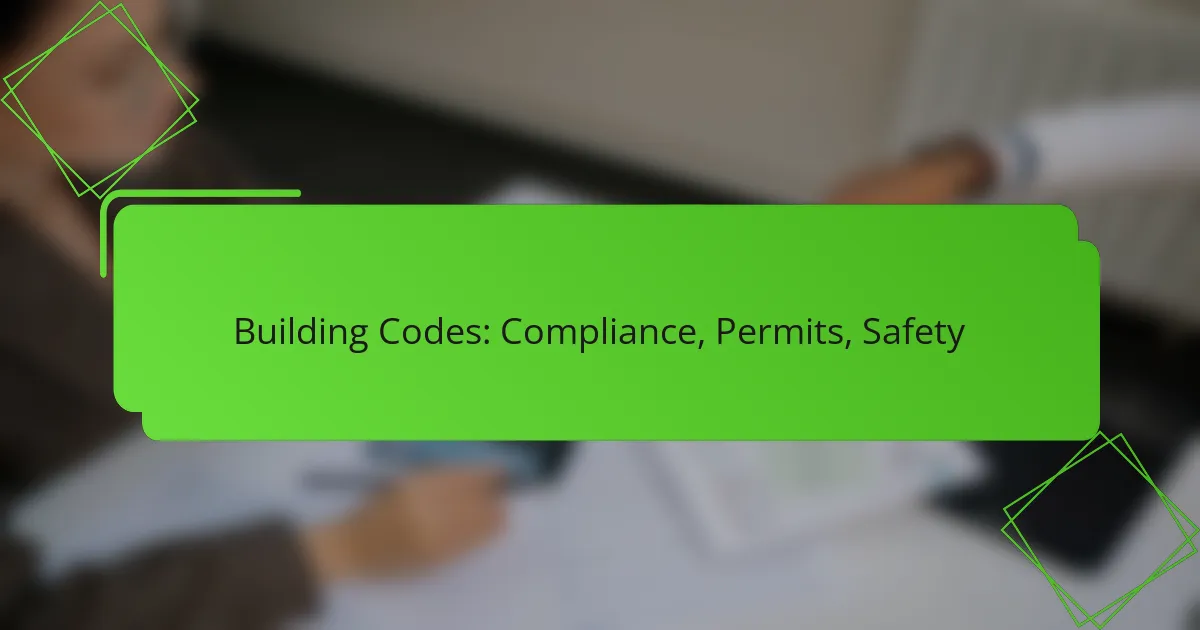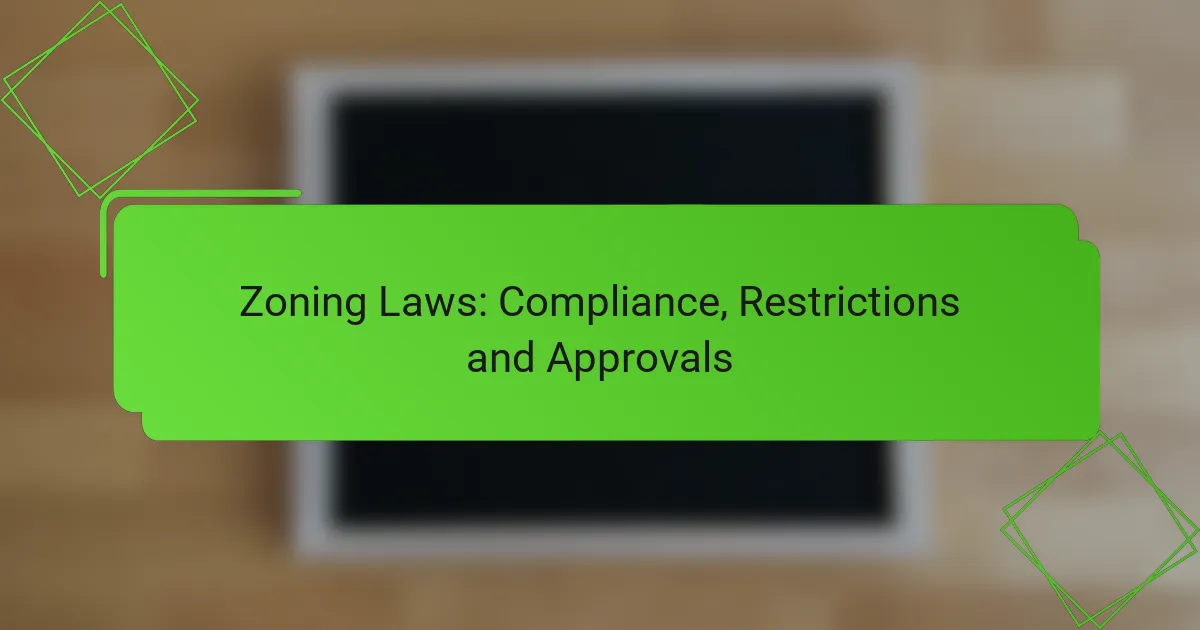Building codes are essential regulations that govern the design, construction, and occupancy of structures, ensuring safety, health, and environmental sustainability. Compliance with these codes requires obtaining the necessary permits and adhering to local regulations, which may vary based on the project’s scope and location. Regular inspections and the involvement of qualified professionals are vital to maintaining safety and meeting established standards throughout the construction process.

What are the building codes in Ireland?
Building codes in Ireland are a set of regulations that govern the design, construction, and occupancy of buildings to ensure safety, health, and environmental sustainability. These codes are enforced at both national and local levels, requiring compliance with various standards and practices.
National Building Regulations
The National Building Regulations in Ireland set the framework for construction practices across the country. These regulations cover various aspects, including structural integrity, fire safety, and energy efficiency. Compliance with these regulations is mandatory for all new buildings and significant renovations.
Key components of the National Building Regulations include Part A (Structural Safety) and Part B (Fire Safety), which outline essential requirements that must be met during the design and construction phases. Builders should consult these regulations to ensure their projects are compliant from the outset.
Local Authority Codes
Local Authority Codes complement the National Building Regulations by addressing specific regional needs and conditions. Each local authority in Ireland may have additional requirements based on local geography, climate, and community standards. These codes can vary significantly, so it’s crucial for builders to check with their local council before starting a project.
Local authorities often provide guidelines on planning permissions, which must be obtained before construction begins. Engaging with local officials early in the planning process can help avoid delays and ensure adherence to all local codes.
Standards for Safety and Accessibility
Safety and accessibility standards in Ireland are integral to building codes, ensuring that structures are safe for all occupants, including those with disabilities. The regulations require that buildings be designed to facilitate easy access and use by everyone, which includes features like ramps, wide doorways, and accessible restrooms.
Compliance with the Disability Access Certificate (DAC) is often necessary for new buildings or significant renovations. This certificate ensures that the design meets the required accessibility standards. Builders should prioritize these features to enhance usability and avoid potential legal issues related to accessibility compliance.

How to ensure compliance with building codes?
To ensure compliance with building codes, familiarize yourself with local regulations and obtain the necessary permits before starting any construction. Regular inspections and hiring qualified professionals are also crucial steps to maintain safety and adherence to standards throughout the building process.
Obtain necessary permits
Before commencing any construction project, securing the appropriate permits is essential. These permits vary by location and project type, so check with your local building authority to determine what is required. Common permits include those for zoning, electrical work, plumbing, and structural changes.
Failure to obtain the necessary permits can result in fines, project delays, or even the need to demolish non-compliant work. Always keep copies of your permits on-site to avoid any disputes during inspections.
Conduct regular inspections
Regular inspections are vital to ensure ongoing compliance with building codes throughout the construction process. Schedule inspections at key stages, such as after foundation work, framing, and before final finishes. This proactive approach helps identify issues early, reducing costly rework later.
In many jurisdictions, inspections are mandated at specific points, so be sure to understand your local requirements. Document all inspections and any corrections made to maintain a clear record of compliance.
Engage qualified professionals
Hiring qualified professionals, such as architects, engineers, and contractors, is critical for ensuring compliance with building codes. These experts understand the regulations and can help design and execute projects that meet safety standards. Look for professionals with relevant licenses and experience in your specific type of project.
Additionally, consider checking references and past work to ensure the quality of their services. Engaging qualified professionals can save you time and money by preventing compliance issues that may arise from unqualified work.

What permits are required for construction projects?
Construction projects typically require several permits to ensure compliance with local regulations and safety standards. The specific permits needed can vary based on the project’s scope, location, and local laws.
Planning Permission
Planning permission is often required for new buildings, major renovations, or changes in land use. This permit ensures that the project aligns with local zoning laws and community plans.
To obtain planning permission, applicants usually need to submit detailed plans, including site layouts and architectural designs. It’s advisable to consult with local planning authorities early in the process to understand specific requirements and avoid delays.
Fire Safety Certificates
Fire safety certificates are essential for ensuring that a building meets fire safety regulations. These certificates confirm that the construction includes adequate fire prevention measures, such as proper exits, fire alarms, and sprinkler systems.
To secure a fire safety certificate, a fire safety assessment must be conducted, often requiring input from certified professionals. Compliance with local fire codes is crucial, as failing to obtain this certificate can lead to significant penalties or project delays.
Disability Access Certificates
Disability access certificates are necessary to ensure that buildings are accessible to individuals with disabilities. These certificates confirm that the construction adheres to accessibility standards, including ramps, elevators, and appropriate signage.
Obtaining a disability access certificate typically involves an assessment of the building’s design and layout. It is important to engage with accessibility consultants early in the planning phase to ensure compliance and avoid costly modifications later on.

What are the consequences of non-compliance?
Non-compliance with building codes can lead to significant repercussions, including financial penalties, legal issues, and project delays. Understanding these consequences is crucial for ensuring adherence to regulations and maintaining safety standards.
Fines and Penalties
Fines for non-compliance can vary widely depending on the jurisdiction and the severity of the violation. Typically, penalties can range from a few hundred to several thousand dollars. In some cases, repeat offenders may face increased fines or additional sanctions.
It’s essential to stay informed about local building codes and regulations to avoid these financial repercussions. Regular inspections and consultations with professionals can help ensure compliance and mitigate potential fines.
Legal Action
Failure to comply with building codes can result in legal action from local authorities or affected parties. This may include lawsuits or orders to halt construction until compliance is achieved. Legal fees and potential settlements can add significant costs to a project.
To minimize legal risks, it is advisable to engage legal counsel familiar with construction law and local regulations. Keeping thorough documentation of compliance efforts can also serve as a defense in case of disputes.
Project Delays
Non-compliance often leads to project delays as authorities may require modifications or additional inspections before allowing work to continue. These delays can extend timelines by weeks or even months, impacting budgets and schedules.
To avoid such setbacks, proactive measures should be taken, such as obtaining all necessary permits before starting construction and conducting regular compliance checks throughout the project. This approach can help keep projects on track and within budget.

How to choose a contractor for compliance?
Choosing a contractor for compliance involves evaluating their qualifications, experience, and track record in meeting building codes. A well-selected contractor will ensure that your project adheres to local regulations and safety standards, minimizing risks and potential delays.
Check qualifications and experience
Start by verifying the contractor’s qualifications, including licenses and certifications relevant to your local building codes. Experience in similar projects is crucial; contractors with a solid background in compliance are more likely to navigate regulations effectively.
Look for contractors who have worked on projects of comparable size and complexity. This experience can be a strong indicator of their ability to manage compliance issues that may arise during construction.
Review past project compliance
Examine the contractor’s history with past projects to assess their compliance record. Request documentation or evidence showing that previous projects met local building codes and safety standards.
Consider reaching out to local building authorities for insights on the contractor’s reputation regarding compliance. A contractor with a clean record is more likely to maintain high standards in your project.
Obtain references and testimonials
Ask for references from previous clients and follow up with them to gauge their satisfaction regarding compliance and project execution. Testimonials can provide valuable insights into the contractor’s reliability and adherence to regulations.
Look for online reviews or ratings on platforms specific to construction services. Positive feedback from past clients can help you make an informed decision about the contractor’s ability to ensure compliance on your project.



